Person-centered therapy, also known as client-centered therapy or Rogerian psychotherapy, pioneered a revolutionary shift in the field of psychology.
As opposed to deficit or symptom-based approaches to therapy, person-centered therapy (also sometimes called humanistic psychology) views individuals as innately valuable and powerful. It also asserts that every person is equipped with an in-built capacity for self-understanding and self-direction, under the right conditions.[1]
One of the most powerful things about person-centered therapy techniques is that they are compatible with virtually all other counseling and coaching methods. Therefore, practitioners of all backgrounds can learn these tools to benefit their clients.
To show you how to incorporate person-therapy techniques into your practice, we’ll give an overview of the model, followed by practical examples of therapy tools you can start using right away.
Brief History Of Person-Centered Therapy
While modern views of psychology sometimes present person-centered therapy as somewhat of an “alternative” approach, the modality played a pivotal role in what psychotherapy has become today.
At the heart of person-centered therapy is its developer, Carl Rogers (1902-1987).
Rogers was a prominent figure in American psychology, and his revolutionary theories laid the groundwork for humanistic and positive psychology. Rogers’ work during the mid-20th century pioneered modern psychology’s emphasis on individual experience and the potential for self-actualization.
The theoretical perspective presented by Rogers upended the traditional therapist-client power dynamic, instead advocating for a non-directive approach that respected and empowered the client’s autonomy and personal wisdom. The shift allowed the clients to assume a more active role in their therapeutic journey, heralding a new era in the field of psychotherapy.[2]
Key Concepts of Person-Centered Therapy
Person-centered therapy is anchored in three key principles of effective psychotherapy:[3]
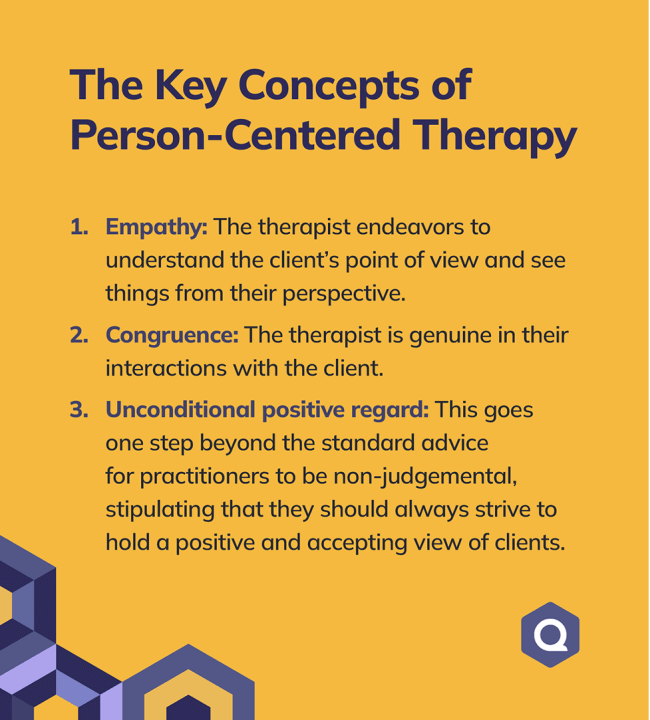
According to Rogers, these principles are the “core conditions” required for a client to heal, thrive, and develop self-understanding and self-direction in therapy.
Power In Simplicity
At first glance, the principles of person-centered therapy might seem somewhat simple and unsophisticated. But as any experienced coach or therapist knows, this is absolutely not the case.
Some examples where providing the core conditions of person-centered therapy can be challenging include:
- Providing empathy to clients who have done or said things that go against the morals or personal values of the practitioner
- Staying genuine and interested when you’re feeling stressed, tired, or generally out of sorts
- Finding a way to regard your clients positively when you have trouble generating positive thoughts about yourself
This simplicity, however, is what makes person-centered therapy so powerful.
Instead of trying to “fix” the perceived deficits of a client, the therapist provides a safe and healing space that fosters healing and personal growth.
Rogers believed that clients needed a problem to bring to therapy to benefit from the process. But the path to recovery lies in understanding that one is whole, worthy, and valuable as a person. As this occurs, an individual learns to live with self-determination and pursue happiness and fulfillment.
Techniques of Person-Centered Therapy
Where cognitive behavioral therapy (CBT) is often referred to as “manualized therapy,” person-centered therapy does not strictly adhere to a predetermined sequence or set of techniques.
Instead, person-centered therapy largely consists of the practitioner utilizing a range of strategies to build a strong therapeutic relationship with the client, which is the cornerstone of the approach.
8 Person-Centered Therapy Techniques
Below are 8 powerful person-centered therapy techniques that any therapist or coach can incorporate into their practice.[4]
- Active listening. Simple gestures like nodding, eye contact, and the occasional “uh-huh” show clients that you are listening and engaged in the therapeutic process.
- Reflection. Repeating what the client has said (also known as “paraphrasing”) is a great way to demonstrate empathy, especially when you pick up on powerful meanings or feelings a client may have shared.
- Clarification. Simply asking a client to clarify or explain more about a point helps them realize that their thoughts, feelings, and experiences have validity and worth.
- Clear boundaries. A positive therapeutic relationship can only occur when there are clear professional boundaries. Remember that being genuine and warm is still possible with clear client-therapist boundaries.
- A client-directed approach. As the name suggests, person-centered therapy is about what the client wants for their life. Not what the therapist thinks they should do.
- Validation of emotions. One of the best ways to demonstrate empathy and congruence is through validating a client’s emotions. When combined with CBT, the therapist must take care to present cognitive distortions in a way that doesn’t lead to the client feeling they are “defective” or “broken” as a person.
- Open-ended questions. Using plenty of open-ended questions ensures the focus of therapy stays on the client’s thoughts, wishes, and experiences. It avoids the problem of the practitioner inadvertently steering the conversation in a particular direction with closed lines of questioning.
- Encouragement. Therapy and coaching is a daunting process for a lot of people. And especially when issues like anxiety, low-self esteem, trauma, and depression are present, clients might benefit from gentle encouraging phrases, like “Tell me more.” “Take your time.” Or, “It’s ok that you felt that way.”
By utilizing these techniques in your practice, you can provide a safe space where clients can confront their vulnerabilities and fears, thereby fostering personal growth and healing.
If you’re looking for an easy way to start using person-centered therapy techniques, Quenza has a library of over 250 Expansions and Activities you can use with clients right now. Get full access today for free, by signing up for our 1-month trial.
Benefits of Person-Centered Therapy
The benefits of person-centered therapy are extensive. It has been shown to:[5]
- Improve self-esteem
- Alleviate anxiety
- Gain deeper self-understanding
- Achieve self-acceptance
- Build more authentic relationships
The therapeutic relationship developed in this style of treatment, anchored in empathy, unconditional positive regard, and genuineness, can bring about impressive levels of transformative change and personal growth.
As individuals come to terms with their true selves and gain new insights into their experiences, they’re better equipped to navigate their lives effectively, make healthier decisions, and form more fulfilling relationships.
Person-Centered Therapy for Depression
Person-centered therapy is a valuable tool in managing depression.
Studies have shown that person-centered therapy can enhance daily functioning among people with depression and reduce overall depressive symptoms.[6]
The non-judgmental and empathetic approach of person-centered therapy provides a safe space for individuals grappling with depression to explore and understand their feelings, fostering self-compassion and resilience.
Moreover, the therapy’s emphasis on self-acceptance and personal growth can be particularly empowering for individuals who’ve become withdrawn and isolated while dealing with depressive disorders, instilling a renewed sense of hope and possibility.
As people struggling with depression work through their experience of the world during person-centered therapy, they may find new ways to view their circumstances and develop healthier coping strategies.
Group Based Person-Centered Therapy
Person-centered therapy is not limited to individual sessions and can be effectively applied in group settings.
Group therapy offers a collective space for individuals to explore their experiences, learn from each other, and gain valuable social support.
The role of the therapist in person-centered group work extends beyond facilitating individual progress: They must create an environment that promotes trust, understanding, and mutual respect.
Research has indicated that person-centered group therapy can lead to similar improvements to those seen in individual work, in areas such as emotional well-being, self-esteem, and interpersonal relationships.[7]
Limitations and Criticisms of Person-Centered Therapy
Like all models of psychotherapy, person-centered therapy has some limitations.
- Critics argue that the lack of a structured approach may not be suitable for all individuals, particularly those who prefer clear guidance or those dealing with severe mental illnesses.
- It’s been suggested that person-centered therapy may not be as effective as other therapeutic modalities (such as CBT) for certain disorders.[8]
- Some insurers and managed care organizations (MCOs) express a preference for time-limited, manualized treatments, in the belief that these are a more cost-effective approach to therapy
However, these limitations do not undermine the value of person-centered therapy.
In fact, research shows that,
“Only about 15 % of the variance in treatment outcome is attributable to specific techniques of different psychotherapeutic schools whereas about 85% of the variance in psychotherapy outcomes is explained by common factors shared by different approaches.”[9]
This highlights the belief held by many practitioners that person-centered therapy is as much a philosophy about delivering high-quality, ethical coaching and counseling, as it is a set of tools and techniques
In essence, person-centered therapy underscores the importance of individualized care in the field of psychotherapy, counseling, and coaching.
Can Person-Centered Therapy Be Delivered Online?
With its focus on human-human interaction and connection, many wonder whether online person-centered therapy can be effective.
The good news is, like other forms of psychotherapy, evidence suggests that online person-centered therapy can deliver emotional support, reduce psychological distress, and enhance well-being as effectively as traditional face-to-face sessions.[10]
Online therapy broadens the accessibility of therapeutic interventions, offering increased convenience for clients. However, for virtual person-centered therapy to be effective, therapists need to make concerted efforts to foster a strong therapeutic relationship online.
Fortunately, digital coaching and counseling platforms like Quenza make this easier than ever.
Person-Centered Therapy in Quenza
The Quenza app is a full-featured, easy-to-use digital platform that helps you increase client engagement, scale your practice, and provide automated care.
To help you seamlessly deliver effective care online, our Expansions library is packed full of exercises that utilize person-centered therapy techniques. You can share these with clients and work through them together in-session, or as homework exercises to be completed in between appointments.
Quenza even enables you to create Pathways for clients—a group of Expansions designed to focus on a particular issue—that are specifically tailored to their needs. This means that even online, you can deliver effective person-centered therapy and coaching.
We’ll detail some of our favorite person-centered therapy techniques below. But if you want to use the full library of 250+ Expansions today, you can get access right now for free with our one-month trial.
Bucket Fillers
Part of becoming self-directed in life is figuring out what makes you feel good and what doesn’t.
Once a person develops insight into this area, they can work toward incorporating more pleasurable, fulfilling, and nourishing activities into their life, while limiting those that tend to be draining or distressing
A great way to explore this with clients is to look at the concept of bucket fillers.
The Bucket Fillers Expansion in Quenza begins with an explanation of the bucket filling process.
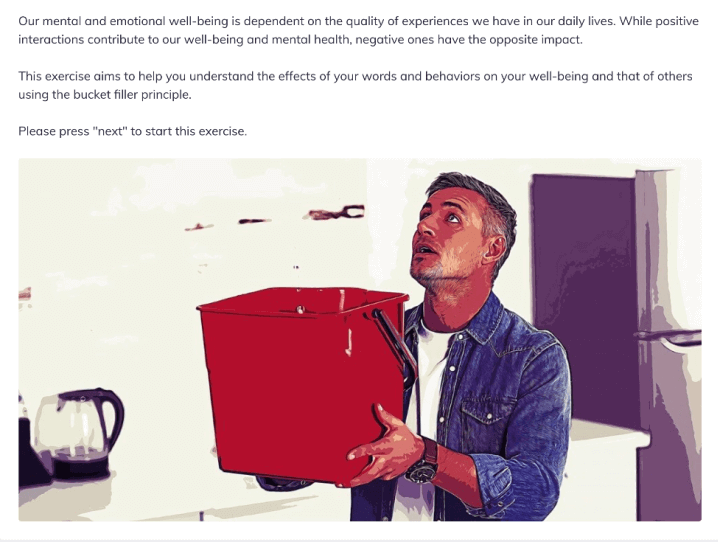
Then guides clients through a journey of self-exploration to find out what (and who) fills their bucket, and what doesn’t.
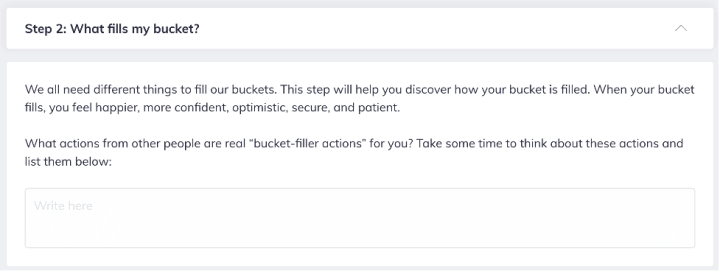
A great Expansion to pair bucket filling with is Planning Pleasurable Activities, which can be done before or after Bucket Fillers.
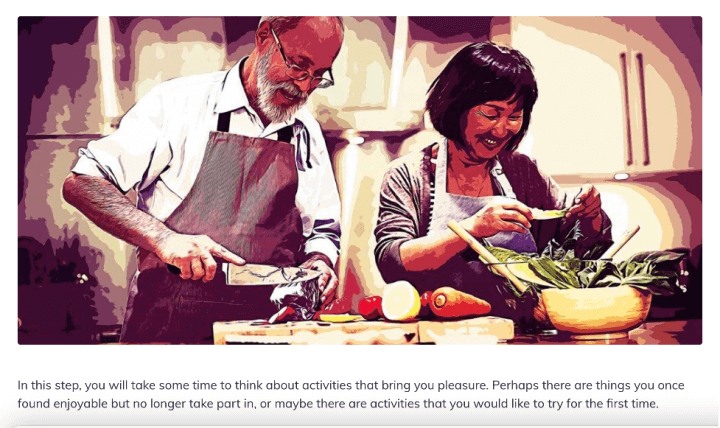
Communicating Boundaries in 5 Steps
The therapist demonstrating clear boundaries is one of the most important person-centered therapy techniques.
This is such a powerful tool because by role-modeling healthy boundaries, the therapist allows the client to see areas where boundaries may be an issue in their life.
To take this learning one step further, therapists can guide clients through a process of developing some tangible tools and strategies to implement healthy boundaries in some of their own relationships.
To achieve this, our Communicating Boundaries expansion provides a 5-step framework for communicating boundaries.
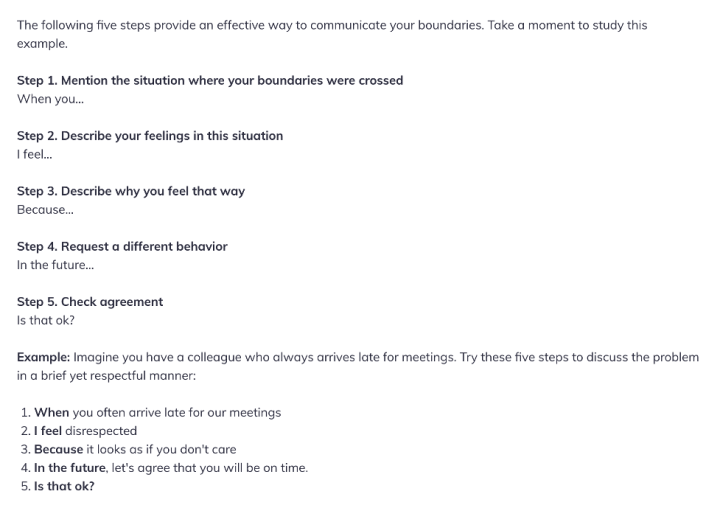
Then guides clients through a process to personalize the framework for their own needs.
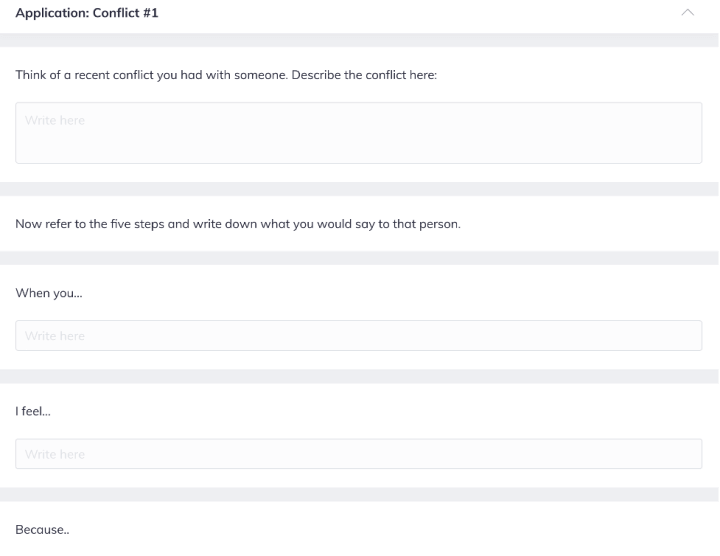
Learning from Value-Based Actions of the Past
Developing insights into one’s personal values provides important information for directions in life that are likely to be rewarding and fulfilling.
But the challenge is, many people aren’t clear on their values. And even when they are, translating this knowledge into action can be difficult.
The Learning from Value-Based Actions of the Past Expansion in Quenza utilizes person-centered therapy techniques to help people explore their values and then take action.
It starts by introducing the concept of translating values into action.
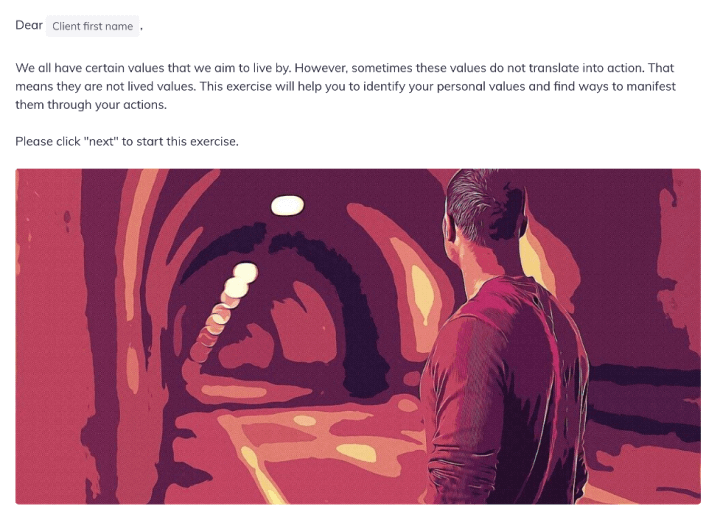
Followed by identifying a value to address.
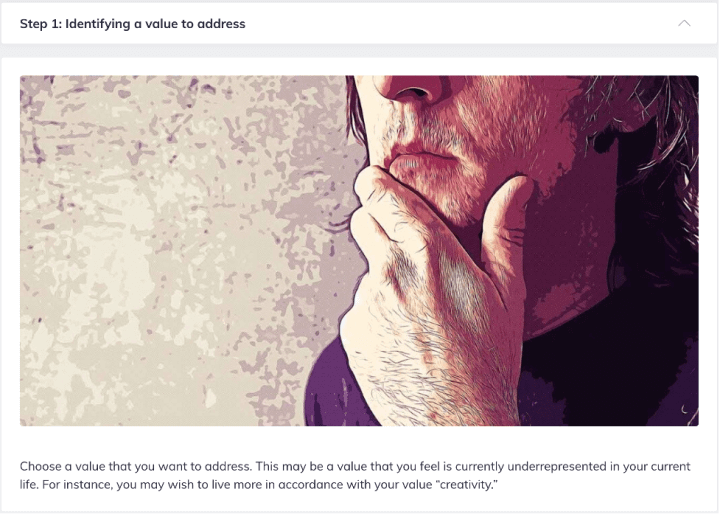
Then considering the past to identify strategies for future values-based actions.
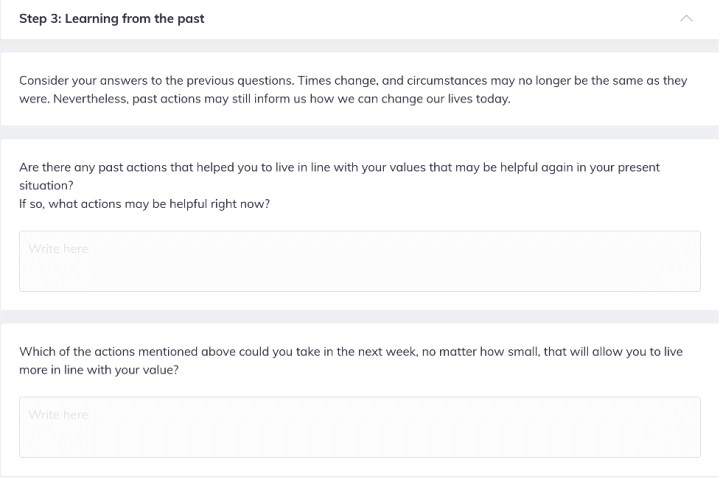
Developing a Personalized Anger Management Plan
Creating a personalized anger management plan is crucial for effectively addressing the unique triggers and responses that each individual experiences. A tailored plan not only considers the specific situations that provoke anger but also incorporates strategies that align with the individual’s personal preferences and lifestyle. The first step in developing such a plan involves self-assessment and reflection to identify the underlying causes of anger and the patterns associated with it. This can be achieved through keeping an anger journal, where individuals record instances of anger, their triggers, the intensity of their reactions, and the outcomes. Over time, this practice can reveal consistent patterns and specific triggers that need to be addressed.
Once the triggers and patterns are identified, the next step is to integrate cognitive-behavioral techniques that are most effective for the individual. Cognitive restructuring can help in challenging and changing the irrational thoughts that lead to anger. Techniques such as deep breathing, progressive muscle relaxation, and mindfulness can be included in the plan to help manage physiological responses to anger. Additionally, problem-solving skills can be developed to address situations that frequently lead to anger, providing a proactive approach to manage potential triggers.
Moreover, a personalized plan should include short-term and long-term goals for anger management. Short-term goals might focus on immediate techniques to calm down when feeling angry, while long-term goals could involve building emotional resilience and improving overall emotional intelligence. Regularly reviewing and adjusting the plan is essential to ensure its effectiveness. Feedback from a CBT therapist can be invaluable in this process, as they can provide professional insights and suggest adjustments based on progress and new challenges. By creating a dynamic and personalized anger management plan, individuals can gain better control over their anger and improve their overall well-being.
Integrating Technology into Anger Management Strategies
In today’s digital age, technology offers innovative solutions that can significantly enhance anger management strategies. Mobile apps, online therapy platforms, and digital self-help tools provide accessible and convenient options for individuals seeking support in managing their anger. These technological tools can complement traditional CBT techniques and offer new ways to track progress, practice skills, and access professional help.
Mobile apps designed for anger management often include features such as guided relaxation exercises, mood tracking, and cognitive restructuring activities. These apps can remind users to practice deep breathing or mindfulness exercises at critical moments, helping them manage anger in real-time. Additionally, they often include educational content that explains the principles of CBT and provides tips for managing anger effectively. By having these resources readily available on their smartphones, individuals can incorporate anger management techniques into their daily routines seamlessly.
Online therapy platforms have also made it easier to access professional help. Virtual sessions with CBT therapists offer the same level of support as in-person sessions but with added flexibility. This can be particularly beneficial for individuals with busy schedules or those living in remote areas. Online platforms also provide a wealth of self-help resources, including workbooks, videos, and interactive exercises, which can enhance the therapeutic process.
Furthermore, wearable technology, such as smartwatches, can play a role in anger management by monitoring physiological signs of stress and alerting users to take action before anger escalates. These devices can track heart rate, sleep patterns, and physical activity, providing valuable data that can help individuals understand their stress responses and identify patterns.
Integrating technology into anger management not only makes the process more convenient but also empowers individuals to take an active role in their emotional regulation. By leveraging digital tools, individuals can enhance their self-awareness, practice coping strategies more consistently, and seek support whenever needed, ultimately leading to more effective anger management.
Conclusion
Person-centered therapy, with its resolute belief in an individual’s capacity for self-growth, has made a lasting impact on the field of psychotherapy.
While it has its limitations, the strength of person-centered therapy lies in its deep respect for personal autonomy, the empathic and supportive therapeutic relationship it fosters, and its adaptability to different settings, including the digital sphere.
Person-centered therapy techniques can be utilized by therapists, counselors, and coaches working with clients of all types. And one of the easiest ways to incorporate these tools into your practice is via ready-made customizable activities, like the Expansions in Quenza.
To get started today, sign up for a full-access 1-month free trial today.
Frequently Asked Questions
In person-centered therapy, the therapist’s role is distinctly non-directive. Unlike in some other approaches where the therapist might lead the conversation or suggest solutions, the person-centered therapist creates a supportive environment characterized by empathy, unconditional positive regard, and congruence. This allows clients to explore their feelings and experiences at their own pace, fostering self-discovery and personal growth. The therapist acts more as a facilitator of the client’s innate capacity for self-understanding and healing, rather than an expert providing direct advice or interpretations.
Yes, person-centered therapy can be highly effective when integrated with other therapeutic approaches. Its core principles of empathy, unconditional positive regard, and genuineness can enhance the therapeutic relationship in any modality. For instance, it can be combined with Cognitive Behavioral Therapy (CBT) to create a warm, accepting environment while also addressing specific cognitive patterns. Similarly, it can complement mindfulness-based therapies by fostering self-acceptance alongside present-moment awareness. The key is to maintain the person-centered focus on the client’s inherent worth and capacity for growth while incorporating techniques from other modalities as needed.
While person-centered therapy is often associated with less severe issues, it can be adapted for more serious mental health conditions. The approach focuses on creating a safe, non-judgmental space where individuals with severe conditions can explore their experiences without fear of stigma. For conditions like schizophrenia or bipolar disorder, the therapist might incorporate more structure while maintaining the core person-centered principles. The emphasis on self-worth and personal growth can be particularly beneficial for those struggling with severe conditions, as it can help combat feelings of helplessness or loss of identity often associated with these diagnoses.
Self-disclosure in person-centered therapy is used judiciously and primarily serves to demonstrate the therapist’s authenticity or congruence. Unlike in some other approaches where self-disclosure might be avoided, person-centered therapists may share their own reactions or experiences if it benefits the therapeutic relationship and the client’s growth. However, this disclosure is always in service of the client’s needs, not the therapist’s. The goal is to model genuine human interaction and to deepen the therapeutic alliance, rather than to provide direct guidance or influence the client’s decisions.
Person-centered therapy emphasizes respect for the client’s unique experiences and worldview, making it well-suited to address cultural differences. Therapists are encouraged to develop cultural competence and to approach each client with genuine curiosity and openness. The principle of unconditional positive regard extends to accepting and valuing the client’s cultural background. Therapists strive to understand the client’s cultural context and how it shapes their experiences, without imposing their own cultural assumptions. This approach allows for a therapeutic relationship that honors and integrates cultural differences, promoting a more holistic and respectful healing process.
References
- ^ American Psychological Association. (2012). Humanistic psychology. APA Dictionary of Psychology.
- ^ Rogers, C. R. (1951). Client-centered therapy: Its current practice, implications, and theory. Houghton Mifflin.
- ^ Rogers, C. R. (1957). The necessary and sufficient conditions of therapeutic personality change. Journal of Consulting Psychology, 21(2), 95-103.
- ^ Rogers, C. R. (1980). A way of being. Houghton Mifflin.
- ^ Elliott, R., Watson, J. C., Goldman, R. N., & Greenberg, L. S. (2004). Learning emotion-focused therapy: The process-experiential approach to change. American Psychological Association.
- ^ Watson, J. C., Gordon, L. B., Stermac, L., Kalogerakos, F., & Steckley, P. (2003). Comparing the effectiveness of process-experiential with cognitive-behavioral psychotherapy in the treatment of depression. Journal of Consulting and Clinical Psychology, 71(4), 773-781.
- ^ Kivlighan, D. M. (2007). Where is the group in research on small group processes? Group Dynamics: Theory, Research, and Practice, 11(1), 28-39.
- ^ Hill, C. E. (2011). Helping skills: Facilitating exploration, insight, and action (4th ed.). American Psychological Association.
- ^ Cloninger, C. R., & Cloninger, K. M. (2011). Person-centered Therapeutics. International journal of person centered medicine, 1(1), 43–52.
- ^ Barak, A., Hen, L., Boniel-Nissim, M., & Shapira, N. (2008). A comprehensive review and a meta-analysis of the effectiveness of internet-based psychotherapeutic interventions. Journal of Technology in Human Services, 26(2-4), 109-160.



